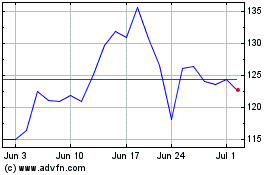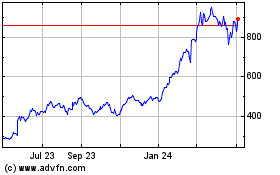The Market Awakens To Risks Facing Tech -- WSJ
March 29 2018 - 3:02AM
Dow Jones News
By James Mackintosh
This article is being republished as part of our daily
reproduction of WSJ.com articles that also appeared in the U.S.
print edition of The Wall Street Journal (March 29, 2018).
The highflying technology stocks had been ignoring rising
threats for a while. Reality reasserted itself on Tuesday.
The immediate cause for plummeting tech shares was
company-specific: Chip maker Nvidia Corp. halted road tests of
driverless vehicles after an Uber Technologies Inc. test car was
involved in a fatal crash, and Facebook Inc. CEO Mark Zuckerberg
will be hauled before Congress. The announcements highlighted the
risks to two of the biggest tech disruption themes, self-driving
cars and social media.
But the market fall wasn't just about Facebook and Nvidia, or
even self-driving cars and social media, although the themes
mattered, with Tesla Inc. dropping more than Nvidia, and Twitter
Inc. losing more than Facebook.
Instead, the market is waking up to an even broader threat:
politics. It might also be sniffing another danger, from
economics.
The political risk is obvious for Facebook, which stands at the
unpleasant intersection of privacy fears and fake news. Facebook is
accused of unwittingly aiding the manipulation of the U.S. election
by Russian agents, of helping swing the Brexit referendum and,
linked to both cases, failing to notice that the personal details
of 50 million users had been snatched.
The arguments about who, what, where and why are far from being
resolved, but Facebook highlights the forces gathering against tech
investors. Disruptive companies are bound to make powerful enemies
in old industries, but the tech companies have alienated many
natural supporters among the wider public through their swagger,
wealth and tax avoidance. Businesses that were once beloved by
consumers for taking on the corporate establishment have become the
corporate establishment in the eyes of many of their customers.
Cities and states were first to flex their muscles, forcing
companies such as Uber and Airbnb Inc. to follow local rules and
pay taxes. The threats now are much bigger.
The European Commission is pushing for a 3% tax on the revenue
of internet giants, while pressure is increasing for "gig economy"
workers to be treated as employees. The rush by companies to pull
their ads from Facebook may be merely temporary, but it shows just
how far the social network has slumped in public opinion and how
much privacy is becoming an issue for Americans. In Europe, privacy
rules have just been tightened again.
There is also a backlash to the sheer scale of many of the big
internet companies. Earnest discussion among economists about the
new monopolies is unlikely to lead directly to government
intervention, but a change in public perception makes antitrust
action more likely. Again, Europe has been leading the way by
taking on Alphabet Inc.'s Google.
There is a further danger, from the economy. A stronger economy
should mean more companies are able to demonstrate rising sales.
Investors who want growth will be able to buy businesses exposed to
the economic cycle, and the fast-expanding tech companies will lose
some of their exclusivity in the minds of shareholders. The same
point can be seen by looking at interest rates. As rates rise,
profits far in the future look less attractive, which should
compress the valuation of disrupters reinvesting all their earnings
in the hope of future returns. If -- and it is a big if -- you
expect the economy to improve and bond yields to rise, disruptive
tech stocks should be less appealing.
Tech stocks rode high in the past three years, ignoring all
these concerns as investors focused on the extraordinary profits
and dominant market shares many were producing. Sentiment was
overly positive, and the backlash was ignored.
It isn't always true that highflying stocks fall further, but it
certainly was on Tuesday. Out of the top 100 stocks in the S&P
500 for the year to Monday, 39 were in the bottom 100 on Tuesday,
about double what would be expected by chance. It worked the other
way, too, with just over one-third of the bottom 100 stocks for the
year in the top 100 on Tuesday, led by General Electric Co., the
fifth-worst performer this year and the best on Tuesday.
In the short run, the drop means the overly fast upward momentum
of the big tech stocks has abated, leaving them less exposed to
further selling driven by technical factors, although Amazon.com
Inc. led more falls on Wednesday after a report that President
Donald Trump wants to target the company.
In the longer run, expect lots of contrition from tech company
CEOs as they try to head off political pressure on the bottom
line.
Write to James Mackintosh at James.Mackintosh@wsj.com
(END) Dow Jones Newswires
March 29, 2018 02:47 ET (06:47 GMT)
Copyright (c) 2018 Dow Jones & Company, Inc.
NVIDIA (NASDAQ:NVDA)
Historical Stock Chart
From Mar 2024 to Apr 2024

NVIDIA (NASDAQ:NVDA)
Historical Stock Chart
From Apr 2023 to Apr 2024
